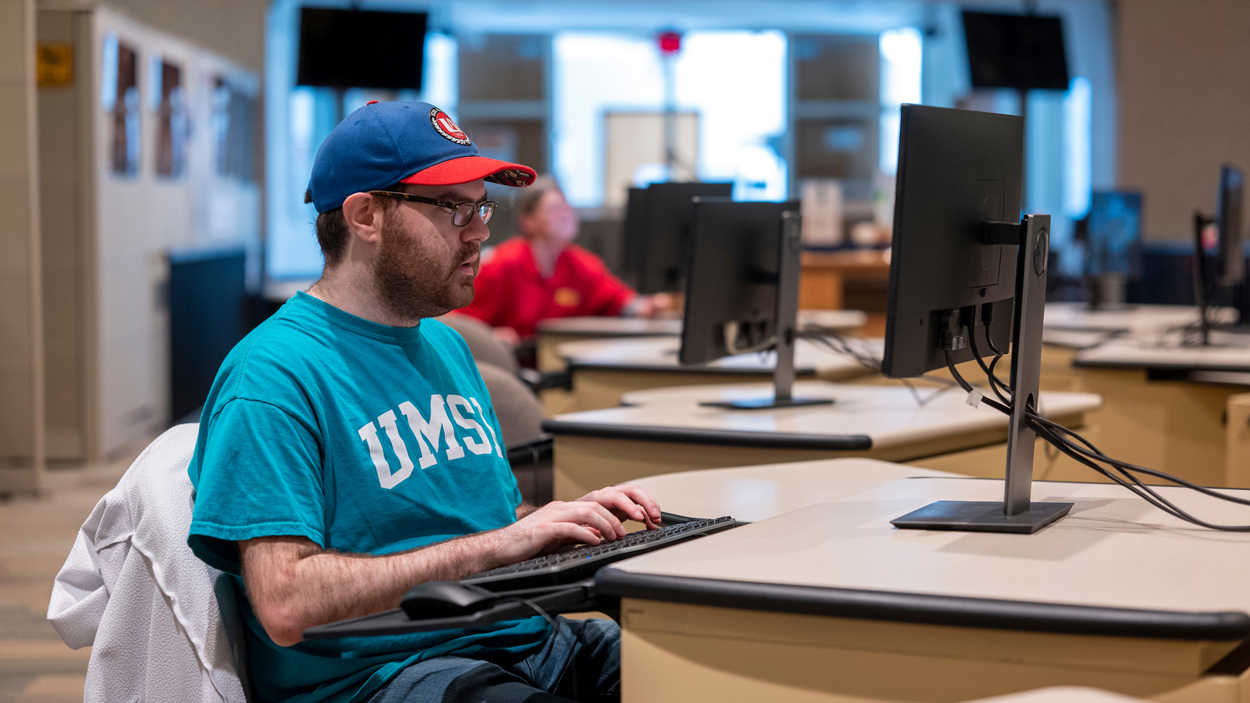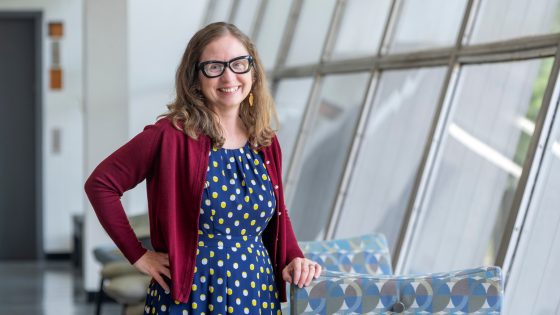
Andrew Holman works in a computer lab during his final semester at the University of Missouri–St. Louis. Holman graduated from the Succeed Program and went on to earn a BES from the College of Education in 2023. He is just one of many students that have benefitted from programs at UMSL designed to help students with intellectual disability develop academic, living, social and vocational skills as they work toward a two-year Chancellor’s Certificate, industry-recognized credentials or a degree program of their choice. (Photos by Derik Holtmann)
The University of Missouri–St. Louis has been a trailblazer in postsecondary education for students with intellectual disability since the founding of the Succeed Program in 2013.
New federal funding will support the expansion of that vital work.
April Regester, associate professor and chair of the Department of Educator Preparation and Leadership, and her co-principal investigators at UMSL have received $2.4 million in funding from a five-year Department of Education Transition and Postsecondary Programs for Students with Intellectual Disabilities (TPSID) grant. The funding will go toward enhancing and expanding Succeed programming, strengthening vocational and academic opportunities, and improving transition services.
College of Education Dean Marius Boboc lauded the award.
“Everyone in the College of Education at UMSL is incredibly grateful for the collaborative efforts that made this milestone possible,” Boboc said. “The $2.4 million TPSID grant is a testament to the longtime work of UMSL’s Office of Inclusive Postsecondary Education that builds on a well-established web of tradition, vision and commitment. Together, we continue to lead the way in creating transformative college experiences for students with intellectual disabilities.”
Over the past decade, inclusive education programming at UMSL has grown rapidly, to now include the Succeed, Succeed+ and Link programs. Collectively, these programs help students develop academic, living, social and vocational skills as they work toward a two-year Chancellor’s Certificate, industry-recognized credentials or a degree program of their choice.
Much of that growth was supported by a 2020 TPSID grant, which provided $2.1 million in federal funding to the university. The funds helped the OIPE implement the Succeed+ program, expanding programming for students beyond the standard two-year Succeed Program. Succeed+ includes an additional year or more of experience and training, while Link, an additional program led by OIPE, supports students who are pursuing a bachelor’s degree or undergraduate certificate. Both programs provide students the opportunity to earn industry-recognized credentials that align with their individual goals.
Regester said previous experience with a TPSID grant was instrumental in preparing for a new round of funding. She noted that the 2020 grant helped the OIPE refine its data collection processes because the office was required to file detailed reports with the Department of Education as well as Think College, a national coordinating center for inclusive higher education programs. OIPE staff members such as Wen Zeng, a grant and research coordinator, were critical to that effort.
Regester and her co-principal investigators – Assistant Professor Magen Rooney-Kron, Associate Professor Lindsay Athamanah, Succeed Director Jonathan Lidgus and Succeed Assistant Director Andrew Kliethermes – were able to use those details to inform their proposal.
“Collectively across the U.S., TPSID programs help us to get a snapshot as to how these programs support students in independent living and employment after graduation,” Regester said. “We learned so much collecting that data over the past five years, which really helped us with this proposal, because we could see where we had room for growth and improvement while also informing us on what was going well, with all data providing evidence to support the ideas that we had.”
That evaluation led to four goals: enhancing vocational curriculum, support services and experiences for students; promoting greater academic accessibility through campus collaborations; facilitating seamless transitions into the Succeed program and beyond it; and expanding high-quality higher education programming for students.
Regester said the employment piece of the proposal was a priority based on the data OIPE collected over the past five years. Rooney-Kron and Athamanah will lead efforts to formalize systems of support, implement innovative curriculum, develop career pathways, engage employers and co-develop trainings to increase staff and student capacity to provide vocational support to Succeed students.

April Regester was instrumental in launching the Succeed Program in 2013.
“We have a heavy focus on improving our employment supports for students,” Regester explained. “So, we’ve partnered with other institutions to do trainings with our staff to help guide us on a tiered system of support for students and form an Excellence in Employment Alliance. Goal one is really addressing what we were seeing ourselves in terms of vocational support needs. We want all our students to leave our program with a plan to engage in the career of their choice and to be paid competitive wages after they graduate.”
The second objective will focus on reciprocal relationships with other academic units on campus to not only support students with intellectual disability, but also to enrich the experiences of other faculty, undergraduate and graduate students in a myriad of OIPE programs on campus.
The project also aims to ease transitions into and out of the program by increasing summer engagement opportunities and reaching potential Succeed students earlier. The standard program is two years, but that’s based on the nine-month academic calendar. Regester said it’s crucial that students can continue their growth throughout the summer, as well. For the past several years, the OIPE has hosted a summer enrichment camp, but it’s limited to high school students considering coming to UMSL for postsecondary education.
“We are shifting to expand our summer offerings, with more opportunities for our existing students,” Regester said. “These students that are already part of our program, we considered what we could do to support their continued learning and growth throughout the summer. We are excited to partner with the sport management program, hosting a new summer academy for disability sport and wellness.”
The grant team also plans to increase outreach efforts, particularly to families in middle and elementary schools to let them know that college is an option for students with intellectual disability. Ideally, early and open communication will help families better navigate their options and bridge the gap between high school and postsecondary education.
“It is all super exciting, because I think we’re going to continue to see positive outcomes for not only our students, but all students and faculty on campus as we deepen our partnerships,” Regester said. “UMSL itself, the St. Louis region, the state, have been so supportive of the work that we do, so it really is kind of a collective celebration right now as we embark on the next five years.”














